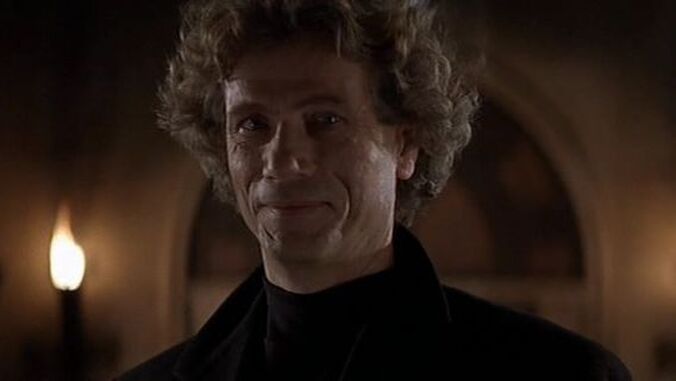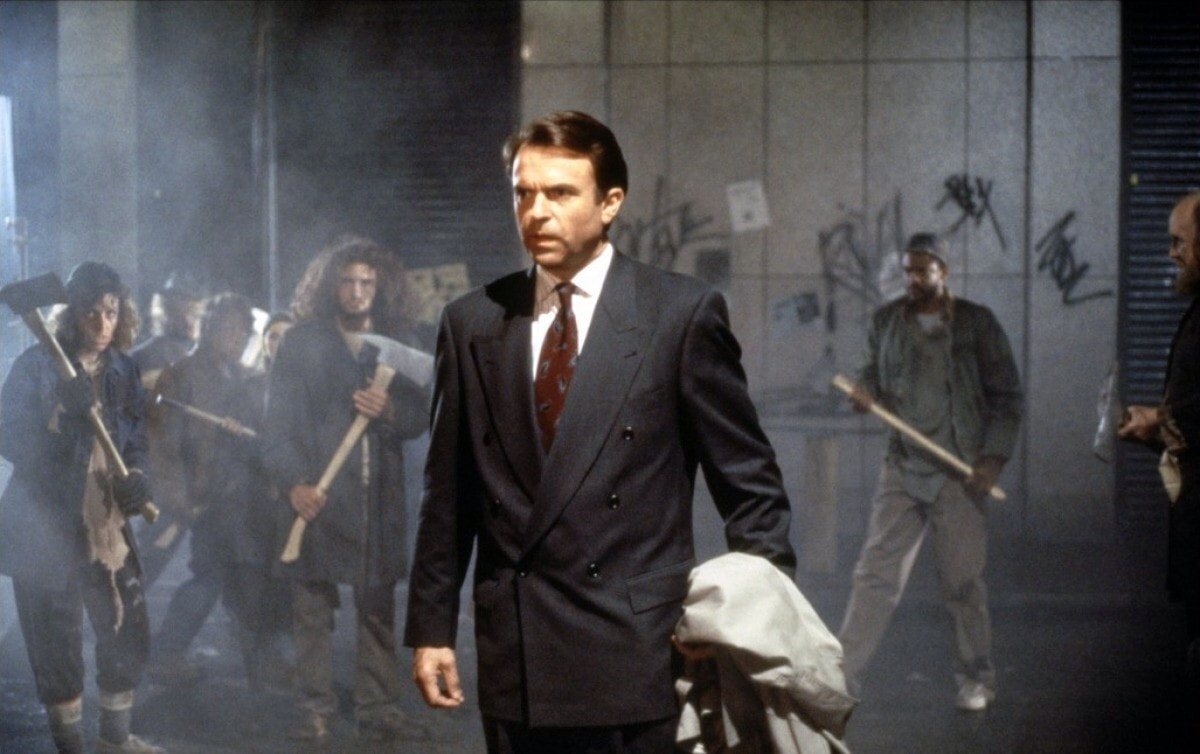 “A reality is just what we tell each other it is. Sane and insane could easily switch places if the insane were to become the majority…” …Those words of dialogue from John Carpenter’s In the Mouth of Madness (1995) are some of the most haunting to me in all of film, and on January 6th, 2021, I witnessed the terror of those words brought to a chilling life. At the time I’m writing this, it still feels like a bad dream, what happened at our nation’s capitol as the Senate and the House met to perform the simple, clerical task of certifying the electoral votes for President Joe Biden’s win. It’s an event that has passed many times before without any interest, yet this time was different. This time, I, along with many others, watched something which we had never had any interest in watching before, out of fear that something that has been traditionally peaceful for centuries may erupt into chaos. And it did. Just not the way we expected. Inspired by days, weeks, months, years of lies, Donald J. Trump’s loyal mob of brainwashed cultists laid siege on the capitol, egged on by men and women in congress parroting Trump’s claims of non-existent mass voter fraud. These people, dressed in their MAGA hats, carrying Trump flags and other disgraceful symbols, swarmed the capitol as we watched live. Some came for violence, but talking in interviews later, many seemed unclear of what the end goal was. They were simply there, because Trump had told them to be. They believed him. Only him. And they were ready to die for him, no matter if they understood what he wanted or not. For years, our country has lived under the madness of Trump and MAGA. And on January 6th, we were swallowed whole by his mouth of madness. What happened at the capitol, what’s been happening to citizens in our nation, is a concept which Carpenter’s film warned us about decades ago. Between 1982-1995, Carpenter delivered what came to be known as his “Apocalypse Trilogy”, with The Thing, Prince of Darkness, and In the Mouth of Madness. All three predict some sort of plague that sweeps the world, and with In the Mouth of Madness, that plague is an unhinged fanaticism that cannot be reasoned with. The film follows John J. Trent (Sam Neil), an insurance investigator who has been hired to investigate the disappearance of the world’s most famous author, horror novelist Sutter Cane (Jurgen Prochnow), so that the publisher can reclaim their investment in Cane’s new book. Skeptical but interested, Trent takes the job, and after piecing together the covers of Cane’s novels, finds a map pointing to Cane’s fictional town of Hobb’s End. With the assistance of Cane’s editor, Linda (Julie Carmen), the two take off to find the town and Cane, unaware that what’s waiting for them is a world of Cane’s own horrific creation. At its unnerving core, Carpenter’s film is about the very idea of the fragility of reality, and how easily it can be shattered by demagogue’s seeking power. Early on, Trent is attacked in a café by a man with discolored eyes about to go full Jack Nicholson in The Shining on him. “Do you read Sutter Cane?”, he asks, before being shot down by police mid-ax swing. He doesn’t know it yet, but Trent has just experienced the Sutter Cane effect. As Linda later explains, Cane’s work has an effect on his readers, one that’s known to make them experience a variety of symptoms, such as paranoid schizophrenia. “People like feeling this way?”, asks Trent, sarcastically, to which Linda simply explains, people like being scared. And she’s right. People do like being scared. But some, in a way they don’t understand. Because some don’t realize that they are actually driven by fear, and that without a boogeyman to pin those fears on, the world doesn’t make as much sense in their eyes. After five years, many of you have probably had a run-in with this element of “Trumpism”. Instead of asking if you read Sutter Cane, they may ask why you wear a mask. Instead of mobbing book stores for the latest release, they gather in contentious crowds at rally’s, chanting angry slogans like “lock her up”. And instead of a “hack horror writer”, as Trent refers to Cane, they follow a hack president…Trump. But in one very important way, the two are the same: both Trump and Cane have supporters hanging on their every word, and no matter what they say, those words are truth. A “truth” that, for them, establishes what they’ve believed all along. Everyone not like them is to be feared, and only they can do something about it. You’ve heard the phrase, “the pen is mightier than the sword,” but I’ve found myself questioning these last few years how much others actually understand the value of those words. The implication is that words matter, especially when they come from places of power. And what position in the world, at least up to recently, holds more power than the President of the United States? It’s easy to ignore it when someone claims that the world is flat. You can roll your eyes and walk away, or keep on scrolling through your social media. But when the President says it? Those words echo across the world. There is no ignoring it. “More people believe in my book than believe in the bible,” says Cane proudly. Trump is practically illiterate, but he doesn’t need to write a book. He has (had) Twitter. He has (had) the attention of every living person, whether they want to listen or not. The danger comes when such a narcissistic liar like Trump has that sort of reach. Because when a person like that and their allies repeat a lie over and over again, that lie, for some, becomes the truth. Trump stood before his group of rabid followers and told them to be “strong” and march on the capitol. And so they did. Once they got there, roars of “stop the steal” rampaged through the building. Trump’s words. Trump’s lie. Through Trent, we witness firsthand the slow progression of how this sort of fanaticism changes a person. Before it all goes down, Trent is your average, boring white dude without much imagination, but he’s well put-together enough. Yet as soon as he experiences that first attack, the guardrails of his mind begin to fall. Trent watches fear-mongering media, similar to Fox, claiming Cane’s followers are “dangerous”. Linda puts thoughts of severe reactions to Cane’s books in Trent’s head, which he then experiences. Hobb’s End citizen Simon (Wilhelm von Homburg) talks to Trent at the bar about Cane’s readers changing into things. And what do you know? Then they do. All of it is powerful suggestion manipulating Trent’s mind, culminating in Cane having the power to say, “did I ever tell you my favorite color was blue,” before Trent wakes up in a world awash in the color. Reality is a fragile belief, and it is not permanent, because what Linda says is true. If you believe the sky is blue, and everyone else says it’s red, then you’re not only looked at as the one who’s wrong, but you might even start to question your own eyes. Because when enough people believe something, it becomes real. Fact ceases to exist when the majority believes otherwise. We witnessed that at the capitol in people who firmly believed they were “patriots”, despite the fact that they were attacking the symbolic structure of their very nation, because they had all told each other they were. What we see Trent go through is what Trump and his allies have done to their supporters. They see monsters too, only their monsters are who they believe to be socialists “stealing” the election. A fictional monster Trump created. That’s not to excuse any of their actions, not at all, but to say that Trump has created a fictional world they all believe in. To the rest of us, it’s insanity. To them, we’re the insane ones. But if they ever became the majority, would you or I still be considered the “sane” ones? Chilling thought, isn’t it? “Reality isn’t what it used to be,” says Simon. And for all of us, that’s been the truth of the last few years. Why I’m writing this is to say that we have to realize reality isn’t permanent. We cannot take reality for granted. It can be molded by the words of powerful people. And what we saw at the capitol, that was the result of the very fabric of reality threatening to tear. If the coup attempt had succeeded, who knows what reality we could be living right now. The lesson in In the Mouth of Madness is the same as what happened at the capitol: we must be wary of those who threaten to change reality with their words, and we must also be careful with how much we bubble ourselves into our own beliefs. Because without contradictory discussion available to us, we have only one “truth,” whether it’s right or wrong. “Every species can smell its own extinction,” whispers Trent, cigarette smoke billowing in his cold, dark, padded cell. Well, we just witnessed the near extinction of Democracy as we know it in America. There will be more Trumps, more Sutter Canes. If we don’t recognize the danger of losing our reality and once again choose to laugh it off or ignore it entirely, it will happen again. What starts as one laughable “leader” can lead to a few supporters, and then a few more, and a few more, recruiting others who think well, if so many believe in this person, then they must be telling the truth. Right? It’s long past time for us to wake up and learn this lesson, or some of us may end up like Trent, sitting alone in a theater, wondering what happened to the world. By Matt Konopka
2 Comments
Bob
3/20/2022 10:41:18 pm
Damn that was retarded.
Reply
Leave a Reply. |
Archives
March 2023
|





 RSS Feed
RSS Feed